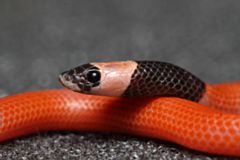Project 5111: F. Licata, L. Pola, J. Šmíd, A. A. Ibrahim, A. V. Liz, B. Santos, L.Patkó, A.Abdulkareem, D. V. Gonçalves, A. M. AlShammari, S.Busais, D. M. Egan, R. M. O. Ramalho, J.Smithson, J. C. Brito. 2024. The missing piece of the puzzle: A new and widespread species of the genus Rhynchocalamus Günther, 1864 (Squamata, Colubridae) from the Arabian Peninsula. Zoosystematics and Evolution. 100 (2):691-704.
Abstract
Discovery rates of new species are uneven across taxonomic groups and regions, with distinctive and widely distributed species being more readily described than species with secretive habits. The genus Rhynchocalamus includes five species of secretive snakes distributed from Egypt eastwards to Iran, including the Arabian Peninsula. A wide biogeographic gap exists within the genus, which separates R. dayanae found in south Israel from R. arabicus, which occurs in the coastal areas of south Yemen and Oman. We describe Rhynchocalamus hejazicus sp. nov., a small, secretive snake, with a distinctive colouration and a melanistic morph. The new species occurs in the northwestern Hejaz region of the Kingdom of Saudi Arabia (KSA) and fills a large part of the existing distribution gap of the genus in the Arabian Peninsula. Molecular analyses of mitochondrial (12S, 16S, cytb) and nuclear genes (cmos, MC1R, NT3, RAG1) indicate that R. hejazicus sp. nov. is closely related to R. dayanae and R. arabicus, but uncertainty on the deep relationship within the genus remains. The new species has a large distribution range which potentially includes other regions in Jordan and KSA, and is associated with mountainous areas with cold wet seasons. Furthermore, it inhabits sandy and stony soils with varying vegetation cover and can be found in anthropogenically disturbed habitats, suggesting that the species should not be categorised as threatened according to IUCN criteria. The discovery of such a distinctive species highlights the existing gap in the description of rare and secretive species, and the need to enhance sampling efforts and monitoring strategies to fully capture species diversity in unexplored areas.Read the article »
Article DOI: 10.3897/zse.100.123441
Project DOI: 10.7934/P5111, http://dx.doi.org/10.7934/P5111
| This project contains |
|---|
Download Project SDD File |
Currently Viewing:
MorphoBank Project 5111
MorphoBank Project 5111
- Creation Date:
01 March 2024 - Publication Date:
30 May 2024 - Media downloads: 1

Authors' Institutions ![]()
- Charles University in Prague
- King Abdullah University of Science and Technology
- National Museum in Prague
- Universidade do Porto (University of Porto, CIBIO included)
- University of Ha'il
- Suez University
- The Royal Commission for AlUla, Oud Dunes
- University of Aden
- Natural History Collective Ventures, Malaysia
- Prince Mohammed bin Salman Royal Reserve Development Authority

